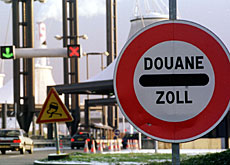Swiss demand freeze on EU tax plans

Switzerland is demanding that the European Union freezes its plans to levy a new tax on re-exports.
The government said a diplomatic note was on its way to the European Commission, following Brussels’ surprise decision to levy the tax from March 1.
The State Secretariat for Economic Affairs (Seco) said the note would convey its “astonishment” that Brussels did not inform Bern officially that it intended to impose the new tariffs on goods exported back to the EU by Swiss firms.
Seco is demanding that negotiators immediately convene talks on a free trade agreement which dates back to 1972.
Luzius Wasescha, a senior Swiss official with responsibility for the country’s international trade relations, said a “bureaucrat” at the European Commission had just discovered that the accord did not apply to re-exports, hence the decision to impose the tax.
The commission later appeared to soften its position, saying the tax would not necessarily be applied from March 1.
A spokesman for the integration office, Stephan Schmid, said Switzerland would “do everything possible” to stop the new regime from being implemented.
Customs
The note is being sent to the European Commission’s customs and taxation office, ahead of talks scheduled for next Tuesday in Basel.
News of the tariffs was published in the Swiss press on Wednesday, after Brussels had informed Swiss exporters.
A row quickly broke out after it emerged that the European Commission had not told the Swiss government of its plans.
Under the 1972 agreement, products and materials imported to Switzerland and subsequently exported back to the EU have not been subject to customs charges.
Wasescha said Switzerland would be seeking “clarification” from the commission as well as a suspension of the planned tariffs. He added that the aim was to have the clause relating to re-exports dropped or amended so as to preserve the status quo.
Wasescha dismissed comments from Commission spokesman, Jonathan Todd, that the tax was “not new”.
Price tag
Officials at Seco said they were unable to put a price tag on the likely cost of the tariffs to Swiss companies, but warned that many businesses would suffer, if it were implemented.
“It’s not possible to quantify exactly what this will mean for the Swiss economy,” commented Seco’s Antje Baertschi.
“But we are talking about a considerable sum, especially when you bear in mind the number of companies affected by this,” she added.
The economics ministry said the worst affected sectors would be textiles, chemicals and pharmaceuticals – which rely on raw materials from EU member states.
In an interview with swissinfo on Thursday, the economics minister, Joseph Deiss, said he did not think the tax had anything to do with a separate dispute with the EU over a taxation agreement.
Commentators had speculated that Brussels was trying to increase the pressure on Switzerland to hand over income from EU residents’ savings in Swiss banks.
swissinfo with agencies
The new tax is aimed at products exported from Switzerland to the European Union which were made using raw materials imported from EU member states.
The chemical, textile and pharmaceutical industries would be most affected by the tax.
Relations between Bern and Brussels are already strained over tax issues.

In compliance with the JTI standards
More: SWI swissinfo.ch certified by the Journalism Trust Initiative










You can find an overview of ongoing debates with our journalists here . Please join us!
If you want to start a conversation about a topic raised in this article or want to report factual errors, email us at english@swissinfo.ch.